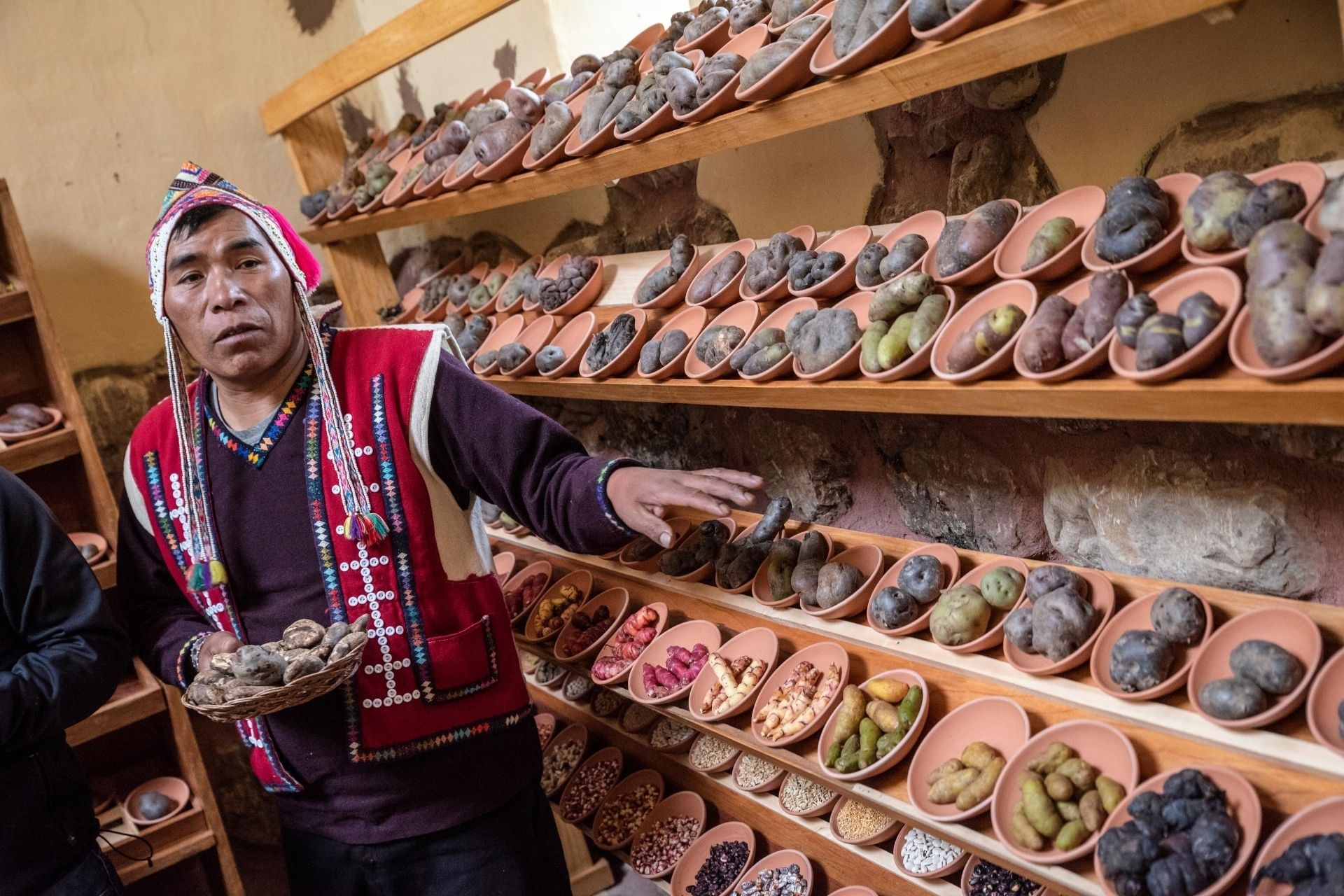You say potato, I say biocultural heritage that safeguards global food security

You are what you eat, goes the saying. What we put into our bodies has a significant impact on them. It literally becomes part of us, alchemizing with the genes bestowed by our ancestors’ dietary choices to make the bodies from which the next generation will come. So, it matters how our food is produced, under what conditions, in what soils.
And yet Westernized societies like the UK are pushing ever closer to becoming monoculture landscapes dependent on significant chemical input for crop survival. Industrialized growth models see us selecting ‘ideal’ products for mass consumption and striving to copy-paste at scale, ad infinitum. Production and efficiency are the rules, and meeting food security and profit margin goals (while beating climate change) is the game.
Is it the right game though?
Quechua farming communities in the Potato Park in the Peruvian Andes think not. They are taking a different approach, future-proofing against climate-driven food insecurity not through maximising efficiency and productivity of one idealized ‘product’, but through guardianship of a living library of biodiversity, with 1,000+ varieties of Andean tubers. Why? Because they recognize that this diversity matters. It is this diversity that brings resilience, both for the food crops themselves, and for those who depend upon them. With crops and people alike, the collective reaps the benefits of embracing the diverse strengths of its unique parts.
Having lived alongside potatoes for centuries, dependent on the species for their own survival, Quechua farming communities have developed an intimate knowledge of hundreds of varieties of them. Dependence on another being motivates a mutually-beneficial partnership, a more relational approach, as opposed to an extractive one. Instead of a one-size-fits-all approach, farmers learn what different potatoes like and don’t like, what makes them happy and grow well, where they like to be, and which beings they thrive among or need protection from. This more intimate relationship means that potatoes are not seen as merely objects of consumption – as is most common in the Westernized monoculture mindset – but a family of diverse individuals with unique qualities and strengths, personalities even.
What difference does this make, for the future of potatoes under climate change, and for global food security as a whole? Why does it even matter if you think of a potato as a unique being, or a lump of food to fill a hungry belly? Because it is this relational approach that underpins the ‘potato guardians’ intimate knowledge of diverse varieties, and it is this knowledge that ensures their adaptation in a rapidly-changing climate. Cultivated potato varieties that can crossbreed with their wild crop relatives directly in the field are proving more resilient to environmental shifts than ‘climate-smart’ varieties grown in the lab.
This shift in perception – from production and consumption to relationship and respect – also means a shift in our values, timeframes and actions. Instead of looking for quick gains and big numbers, we start to value the long-term health, resilience and diversity of our agricultural landscapes. We recognize the importance of using different inputs and methods to safeguard this diversity, and stop measuring against short-term indicators that leave us all at risk of food insecurity – for which climate change, globalization and monoculture agrifood systems are the perfect storm. Temperature rises increase the prevalence of pests and diseases, which then spread uncontrollably through globalized transportation of crops, leaving monoculture farmers ill-equipped to protect their crops without more and more chemical defences, which ultimately kills soils.
So, diversity really does matter, if we are to play the long game. Both in terms of crop diversity as a means of supporting agrifood systems to become more climate-resilient; and in terms of the diverse perspectives we call upon as we collectively learn how to tackle the unprecedented issues we face, in working towards climate-resilient, healthy and sustainable agrifood systems. Recognising this diversity as a marker of health – both of soils and of how we learn – really matters, when you are what you eat.
This blog was authored by Sarah Oakes, a Priestley Climate Scholar and postgraduate researcher on the Leverhulme-funded Doctoral Training Programme in Extinction Studies..
Main image: Mariano Sutta Apocusi introducing Andean tuber varieties in the Potato Park. ‘La plata no se come’ (money can’t be eaten), potato guardian Mariano warns. Credit: Potato Park
